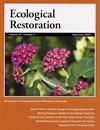幼龄自然与重建北方白杨林分上下层成分的关系
IF 1.1
4区 环境科学与生态学
Q2 ECOLOGY
引用次数: 2
摘要
颤抖白杨是一种无性系树种,通常在森林火灾后从根吸盘中再生,但也能够通过分散在风中的小种子繁殖。在阿尔伯塔省东北部油砂开采后开垦的土地上,白杨林是由种子自然再生的,而附近的火生林主要是由吸根植物再生的。本研究比较了由森林火灾和利用森林底矿物混合物(FFMM)和泥炭矿物混合物(PMM)覆盖土壤的土地复垦活动引起的白杨林的树冠发育和林下植被群落之间的关系。在所有林分类型中,林下生物量与冠层树干密度呈负相关,这表明在扰动六年后,竞争性相互作用开始构建植被。然而,在天然和再生场地,几种林下成分对发育中的树冠表现出不同的反应。火源林分中上层和下层成分之间的正相关性由本地植物群驱动,而PMM开垦土壤上的负相关性由非本地物种驱动。在FFMM开垦土壤上,与本地物种呈正相关,与非本地物种呈负相关。负相关关系表明,非本土的杂类植物抑制了白杨幼苗在开垦地的建立或生长。相比之下,在不需要开放式种子床的火源林分中,本地物种与更大的树冠密度有关。尽管很难确定确切的机制,但很明显,经过六年的生长,不同的过程正在影响再生和火生北方白杨林的植物群落发展。本文章由计算机程序翻译,如有差异,请以英文原文为准。
Relationships between Overstory and Understory Components of Young Natural and Reconstructed Boreal Aspen Stands
A clonal tree species, Populus tremuloides (trembling aspen) typically regenerates from root suckers following forest fire but is also capable of reproducing via small, wind-dispersed seeds. On land reclaimed following oil sands mining in northeastern Alberta, aspen forests are naturally regenerating from seed in contrast to nearby fire-origin stands that are regenerating, predominantly, from root suckers. This study compares relationships between developing canopies and understory vegetation communities for aspen stands originating from forest fire and from land reclamation activities utilizing forest floor—mineral mix (FFMM) and peat—mineral mix (PMM) cover soils. Across all stand types, understory biomass was negatively related to canopy stem density, indicating competitive interactions are beginning to structure the vegetation six years following disturbance. However, several understory components exhibited differential responses to developing forest canopies in natural and reclaimed sites. Positive correlations between overstory and understory components in fire-origin stands were driven by native flora while negative correlations on PMM reclamation soils were driven by non-native species. On FFMM reclamation soils both positive correlations with native species and negative correlations with non-native species were seen. The negative relationships point to non-native forbs inhibiting the establishment or growth of aspen seedlings on reclamation sites. In contrast, native species were associated with greater canopy densities in fire-origin stands where an open seed bed was not required for establishment. Although precise mechanisms are difficult to determine, it is clear that after six years of growth, different processes are influencing plant community development in reclaimed versus fire-origin boreal aspen stands.
求助全文
通过发布文献求助,成功后即可免费获取论文全文。
去求助
来源期刊

Ecological Restoration
Environmental Science-Nature and Landscape Conservation
CiteScore
1.70
自引率
12.50%
发文量
24
期刊介绍:
Ecological Restoration is a forum for people advancing the science and practice of restoration ecology. It features the technical and biological aspects of restoring landscapes, as well as collaborations between restorationists and the design professions, land-use policy, the role of education, and more. This quarterly publication includes peer-reviewed science articles, perspectives and notes, book reviews, abstracts of restoration ecology progress published elsewhere, and announcements of scientific and professional meetings.
 求助内容:
求助内容: 应助结果提醒方式:
应助结果提醒方式:


